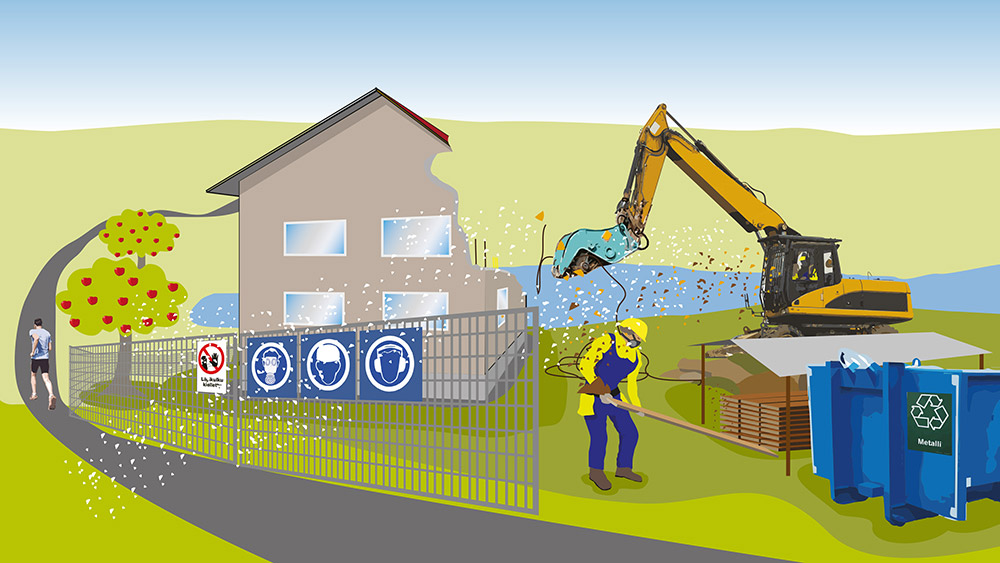Government’s analysis, assessment and research activities
Study: Better flow of information needed to prevent the return of hazardous substances into new products

The aim for Finland is to advance a circular economy, as part of the effort to combat climate crisis and promote the sustainable use of natural resources. But, when moving towards a circular economy, we must also ensure that this causes no problems in terms of human health or the environment. The conclusion of the SIRKKU project that just ended was that the flow of information on hazardous substances in a circular economy should be improved and technologies developed to make sure that these substances are not recycled into new products.
Besides better flow of information, methods must be developed for the identification of chemicals and production of new materials that reduce the use of hazardous chemicals. Less hazardous substances and technologies should be developed and used to substitute for the hazardous ones. Training and guidance on the identification, handling and treatment of hazardous substances and how to dispose of them should be provided to operators in different sectors.
Particular focus on construction waste
The study A sustainable and safe circular economy commissioned by the Government mapped out sectors where improvements are needed in the way chemicals are being managed. The study focused on persistent organic pollutants (POPs) and substances of very high concern (SVHC).
“The key target was to create dialogue with operators in the relevant sectors to find out what kind of support the companies would need to improve the management of chemicals, as we are moving from a linear economy towards a circular economy. A particular focus was on substances contained in construction and demolition waste, but the recommendations given based on the study apply to all sectors, not just construction,” says the leader of the project Sari Kauppi, Senior Research Scientist at the Finnish Environment Institute.
“We had effective collaboration with actors working in the construction business to map out where we stand right know. In addition, ways to improve the procedures were discussed. It became evident that obtaining data on chemicals was often a laborious process for the companies using waste, and it may take a lot of time to apply for the permits needed to make use of waste. This may limit the use of waste material,” says John Bachér, Research Scientist at VTT Technical Research Centre of Finland.
“Especially in waste management and in repair and demolition operations it is important to make sure that chemicals contained in recycled materials do not pose a risk to the employees. Spread of contaminants into the environment must be prevented. In terms of risk management, priority should be given to the planning of safe procedures and technical protection measures. Personal protective equipment must be used if the spread of harmful substances cannot be avoided,” says Sirpa Laitinen, Senior Specialist at the Finnish Institute of Occupational Health.
Circular economy should be promoted through product design
Data on chemicals should follow the product at all stages of its life cycle. Product design is in a key position in this respect. Product design should also pay attention to the reuse, maintenance and recycling properties of the product. Furthermore, materials and substances should be chosen that cause no harm to health or the environment. Innovation policy could support the development of new materials that meet the requirements of a circular economy.
“It is the responsibility of the manufacturer, importer and seller of the product to make sure that all requirements are met. The product must be accompanied by the necessary instructions and information so that the product is safe to take into use, use, maintain, service and remove from use,” says Kati Suomalainen, Senior Officer at the Finnish Safety and Chemicals Agency.
More information to authorities for decision-making
In Finland the legislation to promote a circular economy is already in place, but the authorities still hesitate to make decisions to boost a circular economy as they feel that there is not enough information on the matter. It should be easier to receive a ruling on the waste-status of the waste-based material so that they could be reused as raw material. Especially the permit authorities need more information to support their decision-making.
Inquiries: Sari Kauppi, Senior Research Scientist, Acting Director, Finnish Environment Institute, tel. +358 29 5251 268, firstname.lastname(at)ymparisto.fi, Sirpa Laitinen, Senior Specialist, Finnish Institute of Occupational Health, tel. +358 46 851 1911, firstname.lastname(at)ttl.fi, John Bachér, Research Scientist, VTT Technical Research Centre of Finland, tel. +358 40 534 2067, firstname.lastname(at)vtt.fi, Kati Suomalainen, Senior Officer, Finnish Safety and Chemicals Agency, tel. +358 29 5052 015, firstname.lastname(at)tukes.fi and Hannu Kiviranta, Research Professor, National Institute for Health and Welfare, tel. +358 29 524 6361, firstname.lastname(at)thl.fi
Permanent address of the publication in the Institutional Repository for the Government
Policy Brief: A sustainable and safe circular economy
Information regarding chemicals
Video: A sustainable and safe circular economy

